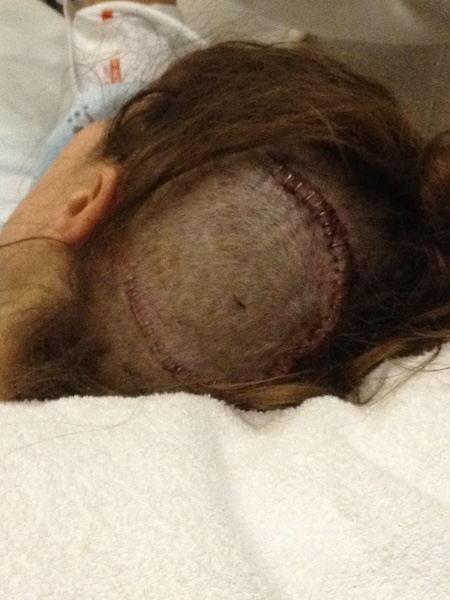In 2012, I got a migraine (my first) that made my right side go numb. It got better in less than an hour, but the next day, the numbness returned. My mother drove me to the hospital, where they did a CT scan, which found a mass in my brain.
An MRI revealed that the mass was in my left lateral ventricle, and it was beginning to sneak toward my brain stem. I was ambulanced directly to the surgical center (without even the chance to go home or finish teaching the week and a half I had left in my term!). Within two days, I underwent a 9-hour surgery to remove the tumor.
They later told me that it was a central neurocytoma (CN), a rare type of tumor that typically affects 25- to 40-year-olds and comprises 0.1 to 0.5% of brain tumors. I was 29 years old at the time and teaching English and writing at a college.
After the surgery, I could not talk, feel, or move my entire right side. I was in the ICU for two-and-a-half weeks, followed by step down for half a week, then a rehab facility for two more weeks, and finally outpatient therapy for several months while I re-learned how to walk, how to talk, how to reason, and how to remember things.
In the hospital, my mother stayed almost constantly by my side, as I could not communicate or even really understand much of what was being told to me. She took catastrophic leave from her job and slept in a chair in my room. Her only breaks came when my father drove to the hospital after getting off work. They sat with me, helped with some of my therapy, and took care of anything that required any sort of decision-making capabilities.
My equilibrium and balance were severely affected, and I could barely ride in a car (much less drive myself) to my therapy sessions, which meant that my parents had to drive me to and from sessions. It took ten months after the surgery to recover enough that I could begin learning to drive again. My cognitive abilities were such that I could not return to teaching, as I could not keep facts, my lectures, or even words straight. I often forgot what I was saying in the middle of my sentences.
After a full year of recovery, I began working part-time at a library. It took me a long time to get to the point where I had recovered enough to think about moving forward with my life. I was able to return to school to get my Master’s of Library and Information Science degree and finally became a librarian.
I did not even learn about NBTS until 2020, but I began reading about other people’s experiences. As hard and slow as my recovery was, I began to see how lucky I had been. My tumor wasn’t cancerous and so far has not recurred after almost thirteen years post-surgery. I had extremely supportive parents who helped me through the surgery and recovery, and I am now able to participate in the Southern California Brain Tumor Walk each year.
I go gray in May because brain tumors have a drastic effect on people’s lives, and research and support are so important, particularly for those whose tumors are malignant. If by sharing my story and sharing information about brain tumors, I can make even one person feel less alone in this journey, I will consider it an accomplishment.
Even benign brain tumors are still brain tumors. The term “benign” suggests that it isn’t that bad, that you just have a simple little surgery, and then your life goes on. But even a benign tumor can drastically affect the entire trajectory of your life and even your definition of who you are. It can break down everything you thought you knew about yourself. Some things can never be fully recovered from, but the point is that you survived it. You survived it, and you keep going. Because you can.



